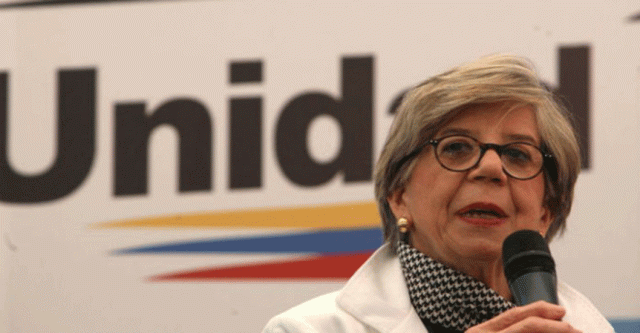
The Primary Election to choose the unitary opposition candidate who will compete in the 2024 presidential election has had to overcome many obstacles, some inherent to the process itself, but others imposed by those who seek to prevent its realization.
By Correspondent lapatilla.com
One of the strongest obstacles is political disqualification which, according to the Constitutional Chamber of the Supreme Court of Justice “refers to the impediment both to holding political or public positions and with regard to the right to vote, so that the rationale of the norm is aimed at preventing a convict from holding public office, whether popularly elected or not.”
According to the polls, María Corina Machado and Henrique Capriles are the candidates with the greatest chance of winning, but with the resignation of Primero Justicia’s candidate, Mrs. Machado – who is disqualified – could win the Primary.
Given this, many concerns arise: What will happen the day after the election of the opposition candidate? Will Machado be able to register with the CNE for the 2024 presidential elections? Will the candidate be replaced? What does María Corina’s statement “until the end” mean?
For Teresa Albanes, coordinator of the ‘Soy Venezuela’ Movement and former President of the MUD Primary Commission in 2012, disqualification is “a totally illegitimate, irrational process. I have to say it like this: to accept that disqualification is what is going to determine how we are going to move, is absurd.”
“It cannot be that a person who has been disqualified so long ago, for only twelve months and thus it expired, suddenly a third-level official appears says you are disqualified for fifteen more years. In that way? It can’t be,” she said when referring (although without naming her) to the case of María Corina Machado.
She assures that this impossibility or obstacle “completely ignores our system of laws, our system of law. This practically eternal deprivation of the exercise of a human right, which is the right to be elected and to choose.”
“Holding on to this concept of disqualification to decide how we move forward is perverse,” is how Mrs. Albanes responds to the question about what to do the day after the Primary.
She assures that the conversations (dialogue tables) between internal factors with international participation could influence “accepting the participation of those ‘disqualified’. That could be an element, one of the agreements (…) although there have already been 13 conversations without success.”
“You have to go one day at a time with the strategies to follow,” Albanes emphasizes, for example, in relation to what to do in the event of the victory of a disqualified person. “Nothing is written, there is no manual, only the guidance of the law.”
Capriles’ resignation
She assured that the resignation of Henrique Capriles, in which he alleges that the sanction for not holding public and popularly elected positions that weighs against him, is the cause for abandoning the process is “complex, but it was not impossible, and it is not impossible to get around this.”
“I think he had a bad time. It is a wrong decision that could be taken as a lesson in morality to the other disqualified people,” but in my opinion, none of them are disqualified according to Venezuelan law.
She hopes that the twelve candidates still in the race “back up their commitment to support the winner, and accompany him/her through the legal actions that must be taken to ensure that the decision of the Venezuelans is respected.”
Last minute judicial decisions
“The process has not been an easy paved road and with only a few days remaining, I am very optimistic, I am totally convinced of the cohesion and strength of the Primary Commission, but there are still latent threats, such as possible action by the Court Supreme Court of Justice, about these ‘annulment appeals’ introduced by ‘false opposition’ created to suit Nicolás Maduro.”
“The most important thing is the Venezuelan population’s desire for change. If I’m honest, that strong desire for change was not like this 11 years ago.” This could influence the reaction of the population to any act against the Primary.
Since last July there has been talk of a possible ruling by the highest court against the Primary, but the support of the National Electoral Council has lowered the volume (probability) on this possibility by classifying it as a “private process, of one political sector.”
That is why Albanes ratifies her phrase of ‘one day at a time, this is how this process should be carried out,’ because anything is possible, especially since the Maduro administration, and particularly from the United Socialist Party of Venezuela (PSUV), Diosdado Cabello has popularized the phrase “don’t dress up, you are not going”, when referring to the opposition primary election.
The truth is that despite the resignations, sanctions and threats, among other obstacles, the process proposed for this October 22nd is still underway and the national, regional, municipal and communal structures of the National Primary Commission are deployed throughout the country.
At this time, information campaigns are being carried out about the electoral centers and the voting process to motivate citizen participation. It is expected that these elections will muster more than three million voters.

